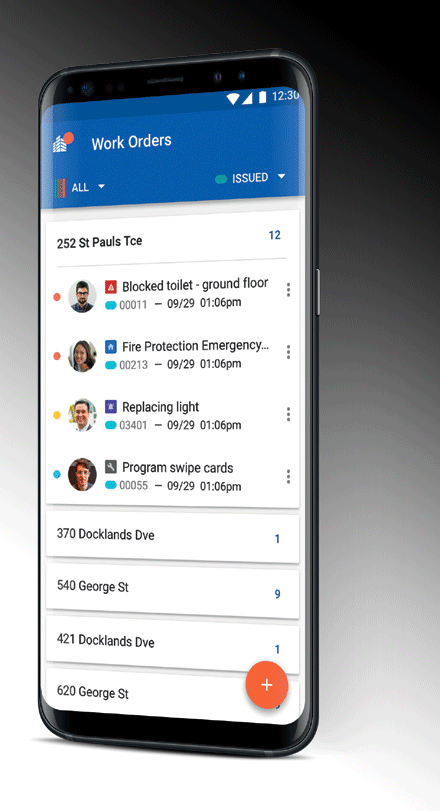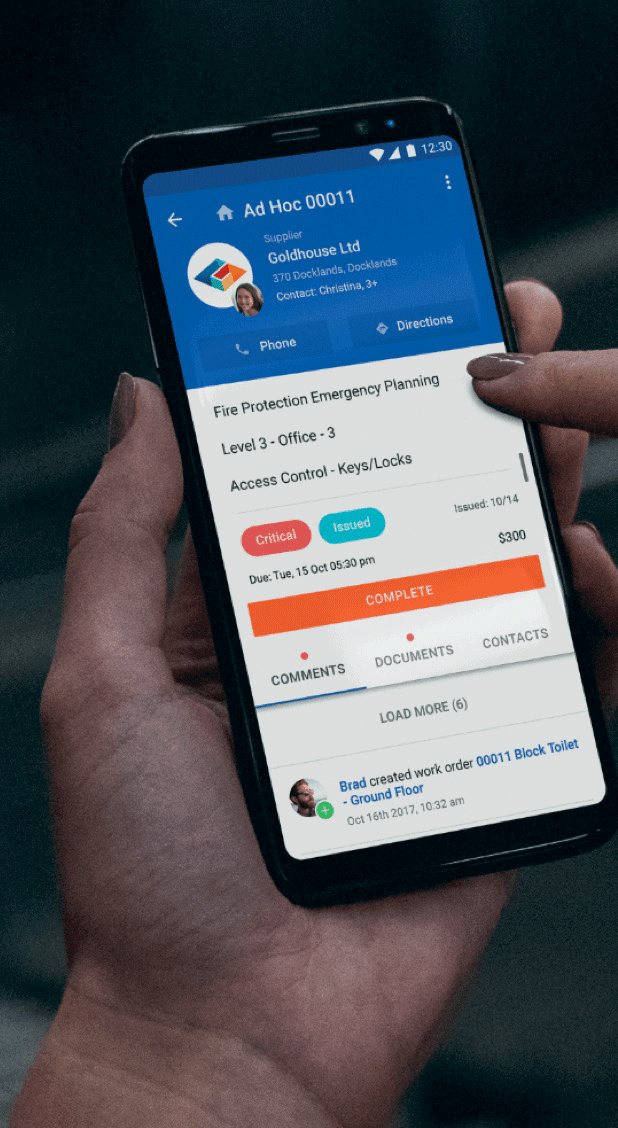THANK YOU FOR SUBSCRIBING
 Richard Ham, Founder & CEO
Richard Ham, Founder & CEOIt’s hard to find a person better equipped to answer those questions than Ham. As a fifth-generation real estate agent, Ham, who holds a Masters in Property, spent more than 15 years managing commercial assets for large corporations such as PwC and JLL before undertaking a single mission: to create simple, intuitive software that simplifies the job of managing facilities/properties.
Ham’s pledge to transform the FM software marketplace was “born out of a need” more so than his desire to pursue entrepreneurship. During his years managing a commercial property, Ham concluded that the assortment of FM software in the market was mired with complexities. The realization came in 2014 when PwC sought a solution capable of managing their vast national portfolio. “When I surveyed the marketplace, I realized the FM software was clunky, laborious, and difficult to comprehend. I felt that the software industry didn’t accurately capture how we did business,” says Ham, who has managed prime Victorian properties such as the Melbourne Water Building and the Government Services Building in Dandenong.
"For years, fms have accepted these mundane administrative functions a part of their job. At fmclarity, we are challenging that notion by streamlining the entire document management aspect"
In trying to decipher the siloed software in the market, Ham reasoned that the disconnect between FM solution providers and the property industry stemmed from the drastic changes in the day-to-day functions of facilities managers. “Traditionally, FM software was developed for hands-on blue-collared engineers that specialized in maintaining assets for the manufacturing sector. This meant that FM software required facilities managers to register every asset and track them in a plucker format-type system,” explains Ham.
 Today, facilities managers “manage services rather than just assets”—a seismic shift in their everyday functions that hasn’t reflected in the FM software. “The industry is now driven by white-collared facilities managers who manage teams and contractors, all while maintaining their risk and compliance. They are not managing just assets anymore,” adds Ham. Frustrated by the overly “asset-based FM software” in the marketplace, Ham tapped into his inner technologist and set about driving change by laying the groundwork for FMClarity.
Today, facilities managers “manage services rather than just assets”—a seismic shift in their everyday functions that hasn’t reflected in the FM software. “The industry is now driven by white-collared facilities managers who manage teams and contractors, all while maintaining their risk and compliance. They are not managing just assets anymore,” adds Ham. Frustrated by the overly “asset-based FM software” in the marketplace, Ham tapped into his inner technologist and set about driving change by laying the groundwork for FMClarity. Bringing Simplicity to FM Software
As a retort to convoluted FM tools in the marketplace, FMClarity has developed simple yet powerful software that reduces the data entry process for FM professionals and simplifies the complex tasks of managing facilities, documents, and compliance. The cloud-based platform, titled FMC Core, allows facilities managers to automate tasks they have been doing manually for years, thereby presenting them with the opportunity to focus on adding value elsewhere. “The software captures every single requirement for facilities and commercial property managers from both a service and risk and compliance perspective,” explains Ham.
FMC Core handles the entire property management cycle from initial work order request all the way to invoicing as well as managing documents, assets, suppliers, risk, and compliance. A collaborative platform that brings together various stakeholders under the same roof, FMC Core enables facilities managers to transition from the traditional approach of phone calls, emails, and follow-ups, to real-time decision-making. Since each stakeholder in the property business—occupiers, property managers, strata managers, suppliers—performs different functions, FMClarity adopted a multi-tenant approach while developing its platform. Again, Ham points to his practical experience of working as a financial property manager, base building facility manager, and even a tenancy facility manager.
We Layered the Software With Functionalities Based on Specific Roles Played by Property Managers, Occupiers, Tenants, and Suppliers
“One of the biggest roadblocks I faced while serving various roles in property & facilities management was the administration aspect. Since we understand various perspectives, we layered the software with functionalities based on specific roles played by property managers, occupiers, tenants, and suppliers.”
While FMC Core is ideal for occupiers and property managers, the FMClarity software suite offers FMC Concierge and FMC Toolbox for strata managers and suppliers, respectively. The byproducts include all core features of FMC Core such as work order management, cloud-based document storage, and management, automated preventative maintenance, real-time portfolio reporting and invoicing, and lease management, among others. The FMC Toolbox also allows suppliers to quote prices, manage customers, and perform supplier job management.
Key Differentiator:
Document Management Tool
The effective administration of occupiers and suppliers aside, the chore of managing documents has always been foremost in a facilities manager’s checklist. Already burdened with servicing clients and managing teams, they are required to search for, file, and scan documents to prove compliance, not to mention documents for reporting, contractual information, proof of approvals and quotes, leases, and a whole lot more. Ham notes, “For years, facilities managers have accepted these mundane administrative functions as a part of their job.” FMClarity is trying to challenge that notion by streamlining the entire document management aspect.
FMC Core’s cloud-based document storage and management tool allows facility managers to save and share files, delegate responsibilities to contractors, and collaborate with other stakeholders in real-time. Rather than going back-and-forth via emails, managers can grant their stakeholders access to documents and chat with them on a work order, thereby saving a ton of time and energy. Applying the same principles of simplicity that define FMC Core, the documentation tool is built on a clean interface; users are not required to memorize the exact work order to find a file since all the documents are automatically filed in a logical tree structure that resembles Windows Explorer. “We ensure that every document brought into the system is incorporated with relevant metadata, making it easy for all stakeholders to delegate responsibilities to the parties responsible for filing the documents (contractors, FMs, or even a staff member),” says Ham. The delegation allows for documents to be filled up automatically before they are generated in the form of reports and aligned with pre-built risk and compliance guidelines.
To illustrate the tremendous benefits of FMC Core’s document management tool, Ham narrates a real-life success story involving genU, a non-profit organization that provides disability services, retirement living, and employment services. FMClarity manages over 200 properties for genU. Before availing the FMC Core platform, genU struggled to manage documents for its vast number of properties and endured the arduous task of manual data entry. FMClarity ingested over 4,500 documents— contracts, service reports, essential safety measures reports, leases, insurances, safe work method statements—into the system and added metadata for each document. Post deployment, genU no longer needed OneDrive or SharePoint to manage documents and could access every document seamlessly on the FMC Core. “We freed up their staff significantly. Pre-deployment, they were busy scheduling contractors to tend to a site at a certain time, trying to handhold contractors to ensure all the tasks were completed adequately, so on and so forth. Now, they can automate all those tasks,” stresses Ham.

Since adopting FMClarity’s solutions, genU has uprooted time-consuming processes that prevented its staff from performing value-added tasks. Pre-FMClarity, genU was heavily reliant on spreadsheets, telephone calls, and outlook calendars. “Our planned maintenance crew and reactive repairs officers would call up contractors, email them instructing to go ‘x’ number of sites to perform particular functions,” says Andrew Mensch, senior property manager at genU. Now, the tasks are pre-scheduled and integrated with the calendar, contractors get alerts on their phones, and everyone is kept in the loop since the platform is cloud-based.
Thanks to FMClarity, genU’s planned maintenance crew can focus on drafting service level agreements and lock up contractors into long-term contracts.
Mensch reasons, “Previously, we never had the opportunity to negotiate long-term deals. Now, we’re able to manage our contractor budgets more effectively.” Meanwhile, genU’s reactive repairs officers can now spend more time on contractor management, the compliance of contractors, and property compliance. “They can do so much more than just waiting for a contractor to arrive on time and following up with others. Also, if an occupier spots a hole in the wall at a property, they can immediately raise a complaint on the messaging board. This eliminates follow-up calls because contractors quickly spring into action,” adds Mensch.
genU is equally impressed with FMClarity’s clean user interface. Mensch praises the user-friendly aspect of the software. “Novices without any software or technical training are able to use the software so easily.”
Taking the Guesswork out of Compliance
A straightforward user experience is indeed one of FMC Core’s strong suits. However, the FMC Core platform is equally proficient in ensuring that facilities managers remain compliant at every stage of the property management cycle. The constant changes in regulations and business requirements have made compliance a challenge for facilities managers. Be it health and safety policies, data security and governance, labor management, or contractual risks, facilities managers have their hands full to remain compliant. FMC Core “takes the guesswork out of compliance” through automated, customizable workflows and alerts for every stakeholder, ensuring that no one overlooks essential safety measures, maintenance or regulatory documentation.
In the event that non-compliance occurs, the stakeholders receive an instant report on their dashboard. The reports are updated live, as events happen, and also consolidated in the form of a monthly report. Brad Wilkinson, the national facility manager at Kaplan Australia, is no longer burdened with compliance-related challenges. “(FMC Core) saves me heaps of time because everything is in one spot, so I don’t have to go through folders on my desktop, I don’t have to follow through emails. All my documents are there, my compliance is there, and everything is transparent, so it’s just made my life a whole lot easier,” he says.
Kaplan Australia isn’t alone. FMClarity’s compliance and risk guidelines element was a huge selling point for genU, too. According to Mensch, genU’s clients are thrilled with the ease-of-access as it pertains to finding a database of certified contractors. “Since all our contractors undergo thorough screening, FMClarity pre-loaded the database of certified contractors into the platform. Today, our clients (at sites) can just instantly connect to a trustworthy plumber.”
Handholding Approach to Platform Implementation
Since most of its customers lack technological expertise, FMClarity undertakes a meticulous approach toward product deployment that involves a lot of “handholding.” A dedicated implementation manager spends ample time at a client site, understanding their business processes and examining their data sets, before recommending either the standardized FMC Core or a customized solution. This approach paid dividends when FMClarity designed a solution for genU. Ham recalls, “We made it a point to understand who they are as an organization. The client appreciated this method, and felt it was rare for a technology company to identify with every division of their company from an FM perspective.”
It’s only after the initial discussions phase that FMClarity takes charge of the client’s project management initiatives. This begins with FMClarity setting up a client’s product portfolio and incorporating into the system all their existing tenants, leases, suppliers, areas, and services. “In the next step, we assemble a list of compliance guidelines that the client can customize as they see fit,” adds Ham. FMClarity also assists clients with internal documentation, stakeholder engagement, template documentation, and communications to streamline the rollout of the platform.
According to Ham, FMClarity’s product deployment approach is a reflection of its work culture. “At every stage of deployment, we are inquisitive and transparent. We are not afraid to ask questions and take on challenges. These values can be found in our everyday operations,” he says, before dwelling on his transition to entrepreneurship. “As a new entrepreneur, I am not reluctant to seek advice from my peers and then share those lessons with others. I believe this transparent work culture has improved our productivity.”
FMClarity’s oath to simplify life for facilities managers is gathering steam. Recently, Ham and his team were showered with praises by industry peers at several real estate Expos where FMClarity showcased the features of its FM software suite. Despite receiving a commercialization grant, a monumental feat for a startup, the company doesn’t plan to take the foot off the pedal. A new reporting engine notwithstanding, FMClarity will continue to add features to its platform. “Since we run on agile methodology, we release new features every few weeks. We are gaining momentum and have a lot of development in the wings.”
“Watch this space. For the FM sector, the future is now,” concludes Ham.
genU is equally impressed with FMClarity’s clean user interface. Mensch praises the user-friendly aspect of the software. “Novices without any software or technical training are able to use the software so easily.”
Taking the Guesswork out of Compliance
A straightforward user experience is indeed one of FMC Core’s strong suits. However, the FMC Core platform is equally proficient in ensuring that facilities managers remain compliant at every stage of the property management cycle. The constant changes in regulations and business requirements have made compliance a challenge for facilities managers. Be it health and safety policies, data security and governance, labor management, or contractual risks, facilities managers have their hands full to remain compliant. FMC Core “takes the guesswork out of compliance” through automated, customizable workflows and alerts for every stakeholder, ensuring that no one overlooks essential safety measures, maintenance or regulatory documentation.
In the event that non-compliance occurs, the stakeholders receive an instant report on their dashboard. The reports are updated live, as events happen, and also consolidated in the form of a monthly report. Brad Wilkinson, the national facility manager at Kaplan Australia, is no longer burdened with compliance-related challenges. “(FMC Core) saves me heaps of time because everything is in one spot, so I don’t have to go through folders on my desktop, I don’t have to follow through emails. All my documents are there, my compliance is there, and everything is transparent, so it’s just made my life a whole lot easier,” he says.
Kaplan Australia isn’t alone. FMClarity’s compliance and risk guidelines element was a huge selling point for genU, too. According to Mensch, genU’s clients are thrilled with the ease-of-access as it pertains to finding a database of certified contractors. “Since all our contractors undergo thorough screening, FMClarity pre-loaded the database of certified contractors into the platform. Today, our clients (at sites) can just instantly connect to a trustworthy plumber.”
Handholding Approach to Platform Implementation
Since most of its customers lack technological expertise, FMClarity undertakes a meticulous approach toward product deployment that involves a lot of “handholding.” A dedicated implementation manager spends ample time at a client site, understanding their business processes and examining their data sets, before recommending either the standardized FMC Core or a customized solution. This approach paid dividends when FMClarity designed a solution for genU. Ham recalls, “We made it a point to understand who they are as an organization. The client appreciated this method, and felt it was rare for a technology company to identify with every division of their company from an FM perspective.”
It’s only after the initial discussions phase that FMClarity takes charge of the client’s project management initiatives. This begins with FMClarity setting up a client’s product portfolio and incorporating into the system all their existing tenants, leases, suppliers, areas, and services. “In the next step, we assemble a list of compliance guidelines that the client can customize as they see fit,” adds Ham. FMClarity also assists clients with internal documentation, stakeholder engagement, template documentation, and communications to streamline the rollout of the platform.
According to Ham, FMClarity’s product deployment approach is a reflection of its work culture. “At every stage of deployment, we are inquisitive and transparent. We are not afraid to ask questions and take on challenges. These values can be found in our everyday operations,” he says, before dwelling on his transition to entrepreneurship. “As a new entrepreneur, I am not reluctant to seek advice from my peers and then share those lessons with others. I believe this transparent work culture has improved our productivity.”
FMClarity’s oath to simplify life for facilities managers is gathering steam. Recently, Ham and his team were showered with praises by industry peers at several real estate Expos where FMClarity showcased the features of its FM software suite. Despite receiving a commercialization grant, a monumental feat for a startup, the company doesn’t plan to take the foot off the pedal. A new reporting engine notwithstanding, FMClarity will continue to add features to its platform. “Since we run on agile methodology, we release new features every few weeks. We are gaining momentum and have a lot of development in the wings.”
“Watch this space. For the FM sector, the future is now,” concludes Ham.
September 12, 2019

I agree We use cookies on this website to enhance your user experience. By clicking any link on this page you are giving your consent for us to set cookies. More info













